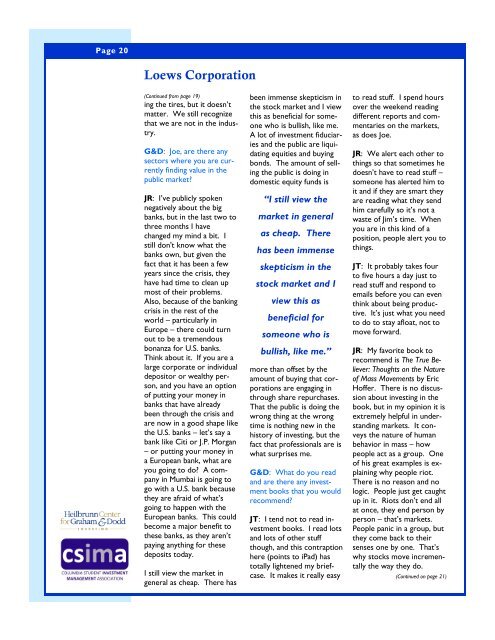Graham & Doddsville - Columbia Business School
Graham & Doddsville - Columbia Business School
Graham & Doddsville - Columbia Business School
Create successful ePaper yourself
Turn your PDF publications into a flip-book with our unique Google optimized e-Paper software.
Page 20<br />
Loews Corporation<br />
(Continued from page 19)<br />
ing the tires, but it doesn’t<br />
matter. We still recognize<br />
that we are not in the industry.<br />
G&D: Joe, are there any<br />
sectors where you are currently<br />
finding value in the<br />
public market?<br />
JR: I’ve publicly spoken<br />
negatively about the big<br />
banks, but in the last two to<br />
three months I have<br />
changed my mind a bit. I<br />
still don't know what the<br />
banks own, but given the<br />
fact that it has been a few<br />
years since the crisis, they<br />
have had time to clean up<br />
most of their problems.<br />
Also, because of the banking<br />
crisis in the rest of the<br />
world – particularly in<br />
Europe – there could turn<br />
out to be a tremendous<br />
bonanza for U.S. banks.<br />
Think about it. If you are a<br />
large corporate or individual<br />
depositor or wealthy person,<br />
and you have an option<br />
of putting your money in<br />
banks that have already<br />
been through the crisis and<br />
are now in a good shape like<br />
the U.S. banks – let’s say a<br />
bank like Citi or J.P. Morgan<br />
– or putting your money in<br />
a European bank, what are<br />
you going to do? A company<br />
in Mumbai is going to<br />
go with a U.S. bank because<br />
they are afraid of what’s<br />
going to happen with the<br />
European banks. This could<br />
become a major benefit to<br />
these banks, as they aren’t<br />
paying anything for these<br />
deposits today.<br />
I still view the market in<br />
general as cheap. There has<br />
been immense skepticism in<br />
the stock market and I view<br />
this as beneficial for someone<br />
who is bullish, like me.<br />
A lot of investment fiduciaries<br />
and the public are liquidating<br />
equities and buying<br />
bonds. The amount of selling<br />
the public is doing in<br />
domestic equity funds is<br />
“I still view the<br />
market in general<br />
as cheap. There<br />
has been immense<br />
skepticism in the<br />
stock market and I<br />
view this as<br />
beneficial for<br />
someone who is<br />
bullish, like me.”<br />
more than offset by the<br />
amount of buying that corporations<br />
are engaging in<br />
through share repurchases.<br />
That the public is doing the<br />
wrong thing at the wrong<br />
time is nothing new in the<br />
history of investing, but the<br />
fact that professionals are is<br />
what surprises me.<br />
G&D: What do you read<br />
and are there any investment<br />
books that you would<br />
recommend?<br />
JT: I tend not to read investment<br />
books. I read lots<br />
and lots of other stuff<br />
though, and this contraption<br />
here (points to iPad) has<br />
totally lightened my briefcase.<br />
It makes it really easy<br />
to read stuff. I spend hours<br />
over the weekend reading<br />
different reports and commentaries<br />
on the markets,<br />
as does Joe.<br />
JR: We alert each other to<br />
things so that sometimes he<br />
doesn’t have to read stuff –<br />
someone has alerted him to<br />
it and if they are smart they<br />
are reading what they send<br />
him carefully so it’s not a<br />
waste of Jim’s time. When<br />
you are in this kind of a<br />
position, people alert you to<br />
things.<br />
JT: It probably takes four<br />
to five hours a day just to<br />
read stuff and respond to<br />
emails before you can even<br />
think about being productive.<br />
It’s just what you need<br />
to do to stay afloat, not to<br />
move forward.<br />
JR: My favorite book to<br />
recommend is The True Believer:<br />
Thoughts on the Nature<br />
of Mass Movements by Eric<br />
Hoffer. There is no discussion<br />
about investing in the<br />
book, but in my opinion it is<br />
extremely helpful in understanding<br />
markets. It conveys<br />
the nature of human<br />
behavior in mass – how<br />
people act as a group. One<br />
of his great examples is explaining<br />
why people riot.<br />
There is no reason and no<br />
logic. People just get caught<br />
up in it. Riots don’t end all<br />
at once, they end person by<br />
person – that’s markets.<br />
People panic in a group, but<br />
they come back to their<br />
senses one by one. That’s<br />
why stocks move incrementally<br />
the way they do.<br />
(Continued on page 21)



